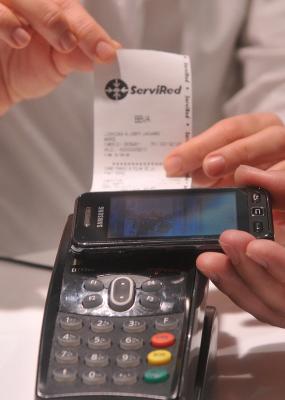Telefónica Announces Large NFC Employee Trial in Spain

Telefónica Spain has announced its large NFC trial at its Madrid headquarters, which it said would eventually put NFC phones into the hands of as many as 12,500 employees.
The trial began in March with 1,000 employees, who can tap their Samsung NFC phones to pay at restaurants and some retail outlets in and around the telco’s big headquarters campus, as well as entering buildings or work areas.
The trial involves three Spanish banks along with Visa Europe, and likely will serve as a prelude to NFC rollouts by Telefónica in Spain. The operator is the flagship for the Spain-based Telefónica Group.
As NFC Times reported last year, the project was expected to launch last June, but had been delayed. Telefónica is using Samsung’s S5230 NFC phone for the project, known as the Samsung Star in Spain. Samsung is also coming out with NFC-enabled smartphones by the middle of this year, which might be added later to the project, or other NFC phones.
Telefónica has expanded the scope of the project from what was originally planned, announcing Thursday that banks La Caixa, BBVA and Bankinter are involved, along with Visa Europe and processor and payment technology platform provider Sermepa.
Update: The trial enables Telefónica employees to choose their own debit or credit card account from these banks and have it loaded onto Telefónica SIM cards and personalized over the air. They also can tap to enter work areas with an ID application stored on their SIMs, and can load meal vouchers or prepaid value on the cards for dining at company cafeterias and restaurants.
France-based Oberthur Technologies is serving as trusted service manager for the project and Germany-based Giesecke and Devrient is supplying the NFC-enabled SIMs, Telefónica told NFC Times. End update.
"By launching this initiative and other similar projects, which we will deploy in other countries where we operate, Telefónica aims to prepare for deployment in Spain and lead the way in NFC development," said Guillermo Ansaldo, who heads Telefónica España, in a statement.
La Caixa and Telefónica, along with Visa Europe, last May launched a high-profile NFC pilot in the resort town of Sitges near Barcelona. The trial enabled about 1,500 users to tap their Samsung Star phones to pay at 500 merchant locations, with a Visa payWave application stored on SIM cards issued by Telefónica. The new headquarters trial puts the secure applications, such as payment, onto Telefónica’s SIMs.
Telefónica said in announcing the new trial that the results of last year's Sitges trial shows the "vast potential" of mobile payment. The trial organizers said customers conducted 30% more transactions, presumably compared with their cards. Average purchase value increased substantially, as well. And the trial saw "acceptance of the technology by all groups," with the average age of customers using their mobile phones to pay coming in at 46.
The fact that La Caixa and two other banks are involved in the new trial and with the telco planning to increase the number of trial participants to more than 12,000 employees likely means the pilot will expand to more retail establishments off of the Telefónica campus. But contactless payment has not yet been rolled out throughout Spain so there are few merchants in Madrid equipped to accept contactless payment, at present. Update: But La Caixa appears to have an aggressive plan to roll out contactless technology, starting in the Balearic Islands. It will equip 5,000 merchants there with contactless terminals and send out 130,000 Visa payWave cards to customers on the islands this spring. End update.
Both of the other two banks participating in the trial, BBVA and Bankinter, have held their own NFC trials. Bankinter’s trial involved its own mobile virtual network operator service, Bankinter Mobile, enabling it to issue both the SIM cards and Visa payWave payment applications used in the employee trial, which launched last fall.
Telefónica’s Sitges trial and the new one at its headquarters also indicates that Telefónica, at least in Spain, plans to work with banks for mobile payment. Other branch operators in the Telefónica Group, such as Telefónica O2 operators in the United Kingdom and Germany, plan to introduce their own payment services–though O2 UK might work with one of the established international card brands, such as Visa.
According to Telefónica, the large headquarters trial is enabling employees to tap to pay at stores on campus and at "local establishments." They also can load meal vouchers or prepaid value onto the SIM cards to pay at company cafeterias or restaurants operated by Autogrill.
The trial is also be one of the most high-profile uses of an access-control application on NFC phones. Telefónica said employees can tap to enter work areas, with the ID credentials loaded onto the SIMs in the phones.
Among other NFC trials testing physical access control was a large pilot held by Taiwan’s Chunghwa Telecom, which enabled up to 6,000 users to tap to enter their apartment complexes. The trial also included payment and transit ticketing.












